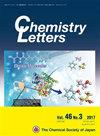Synthesis and electrochemical properties of Li5 + xFe1–xMnxO4 with an antifluorite-type structure as a lithium battery cathode
IF 1.1
4区 化学
Q3 CHEMISTRY, MULTIDISCIPLINARY
引用次数: 0
具有反萤石型结构的 Li5 + xFe1-xMnxO4 作为锂电池正极的合成与电化学特性
摘要 通过常规固态反应合成了一种新型反氟化物结构的 Li5 + xFe1-xMnxO4,并通过电化学测量对其锂(去)插殖特性进行了表征。当 x ≥ 0.6 时,获得了具有 Li6MnO4 型结构的单相。经球磨处理的 Li5.6Fe0.4Mn0.6O4 (x = 0.6) 电极的首次放电容量为 450 mAh/g。在随后的循环中,可逆反应继续进行,放电容量约为 200 mAh/g。具有反萤石结构的新型铁锰体系可能成为高容量阴极材料的潜在候选材料。
本文章由计算机程序翻译,如有差异,请以英文原文为准。
求助全文
约1分钟内获得全文
求助全文
来源期刊

Chemistry Letters
化学-化学综合
CiteScore
3.00
自引率
6.20%
发文量
260
审稿时长
1.2 months
期刊介绍:
Chemistry Letters covers the following topics:
-Organic Chemistry-
Physical Chemistry-
Inorganic Chemistry-
Analytical Chemistry-
Materials Chemistry-
Polymer Chemistry-
Supramolecular Chemistry-
Organometallic Chemistry-
Coordination Chemistry-
Biomolecular Chemistry-
Natural Products and Medicinal Chemistry-
Electrochemistry
 求助内容:
求助内容: 应助结果提醒方式:
应助结果提醒方式:


